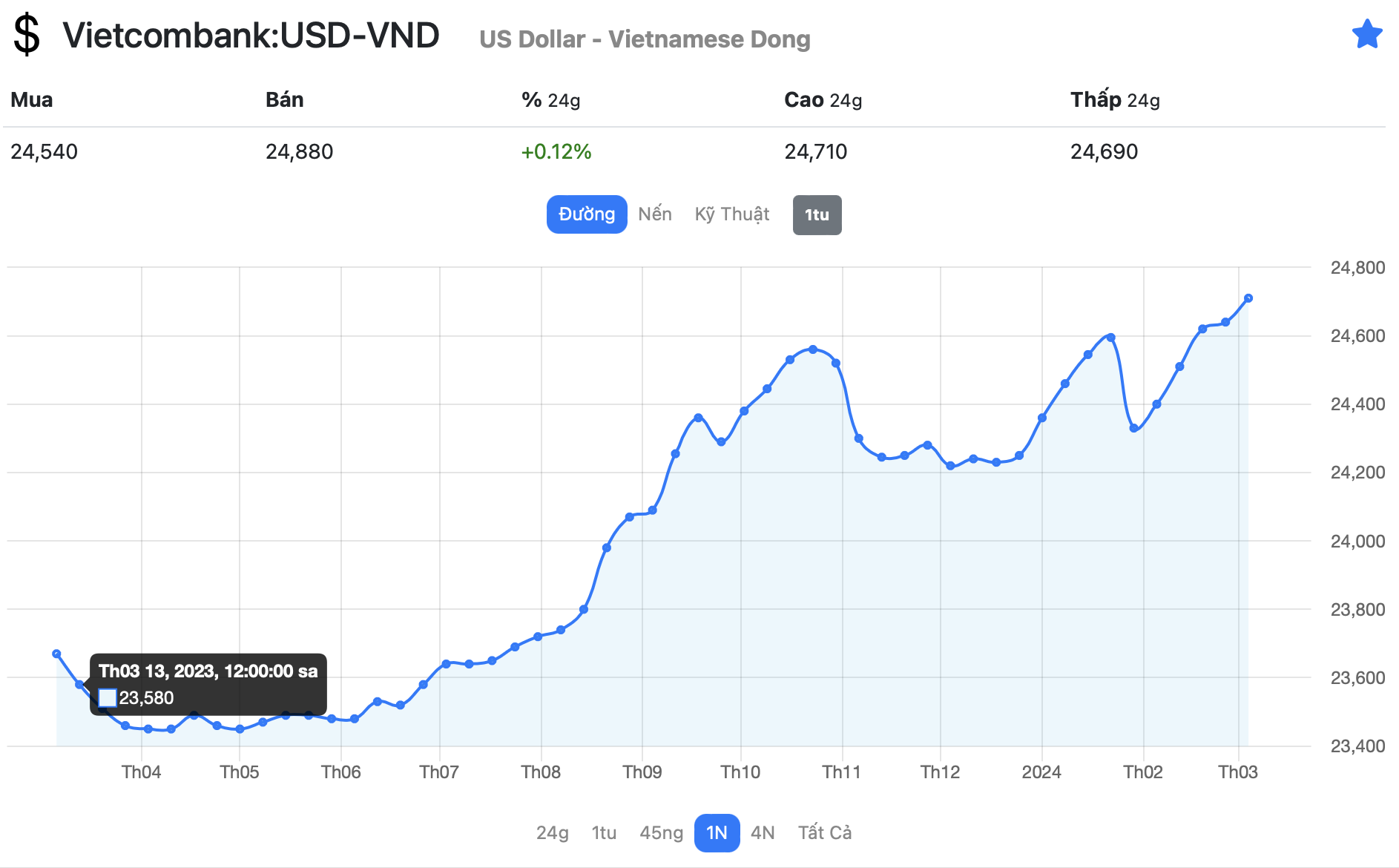Since the beginning of the year, the exchange rate situation has heated up again. Specifically, the central exchange rate set by the State Bank of Vietnam is at 24,017 VND, approaching the historical high central exchange rate of 24,700 VND recorded in 2022. From the beginning of the year until now, the central exchange rate has increased by 146 VND/USD, while in the same period last year it only increased by 25 VND/USD.
In commercial banks, the USD/VND exchange rate is also trading at a historical high level (the record high exchange rate when selling USD at commercial banks was 24,876 VND in 2022). For example, at Vietcombank, the buying rate (for transfer) – selling rate is around 24,510 VND and 24,850 VND/USD. Compared to the beginning of the year, this represents an increase of 430 VND, or 1.8%.

Source: Pricedancing.com
Both domestic and international economic experts believe that the exchange rate is fluctuating in the context of the USD maintaining its strength as the Federal Reserve (Fed) has not lowered interest rates as previously expected. The rising exchange rate has raised concerns among investors as it can directly impact macroeconomic stability and capital flows in the stock market.
Speaking at a recent seminar organized by Investment Newspaper, Mr. Tran Hoang Son – Strategic Market Director of VPBank Securities Company, pointed out that from the beginning of the year until now, the exchange rate has continued to rise. The free market exchange rate has recently exceeded 25,000 Vietnamese dong, and the interbank exchange rate is also increasing rapidly.
In the case of exchange rate fluctuations exceeding about 2.7 – 3%, it could cause a correction in the stock market. The period in 2022 when the exchange rate soared to a very high level was also a period of strong selling by domestic and foreign investors. Most recently, in 2023, there was also a period in the second half of the year when the exchange rate increased quite sharply.
According to experts, there are three factors affecting the current exchange rate situation. Firstly, the interest rate differential between VND and USD remains very high at around 500 basis points.
Secondly, the price difference in assets such as gold. In recent times, the price difference between world gold and domestic gold has been quite high, creating a high demand for gold imports, including jewelry gold and gold rings. This factor has increased short-term USD demand and affected the exchange rate.
Thirdly, the story of foreign investors withdrawing capital from the stock market in the second half of last year has also increased the tension in the USD demand on the market.
However, in 2024, the State Bank and the Government have also identified some issues that need to be monitored in the future. Specifically, the Fed may lower interest rates in the middle of this year, reducing the interest rate differential between VND and USD, which could help alleviate the pressure on the exchange rate.
In terms of recent gold price fluctuations, the Government may soon amend regulations on managing the gold market to ensure a stable supply of gold for consumer demand and reduce price differences. This could alleviate pressure on the exchange rate.
In terms of macroeconomic balance, exports are picking up pace and there is still a surplus from exports. FDI into Vietnam is also growing positively, along with remittance flows, which are sources of USD supply in the market. Vietnam’s foreign exchange reserves are currently quite good and will be one of the factors helping to keep the USD/VND exchange rate stable this year, although there may still be a slight depreciation.
From an international perspective, according to observations by VPBankS experts, many currencies in the Asian region have depreciated deeply, such as the Korean won (KRW), the Japanese yen, and even the Euro (EUR) and Pound (GBP). Therefore, the stability of Vietnam’s domestic currency with a slight depreciation is already a success this year.
In conclusion, regarding the impact of exchange rate fluctuations, Mr. Tran Hoang Son believes that exchange rates usually depreciate each year, but they will generally remain stable at below 2%. If stability is maintained at this level, the impact will not be significant, while also providing support for exports, especially in the global context.
“If the exchange rate depreciates by more than 3%, it will affect the economy as import-export enterprises will face more disadvantages due to the exchange rate difference and may experience loss accounting due to exchange rate differences. On the other hand, exchange rate fluctuations will immediately affect foreign capital flows trading on the Vietnamese stock market and may cause foreign investors to withdraw capital when there is substantial exchange rate fluctuation,” said the VPBankS expert.












